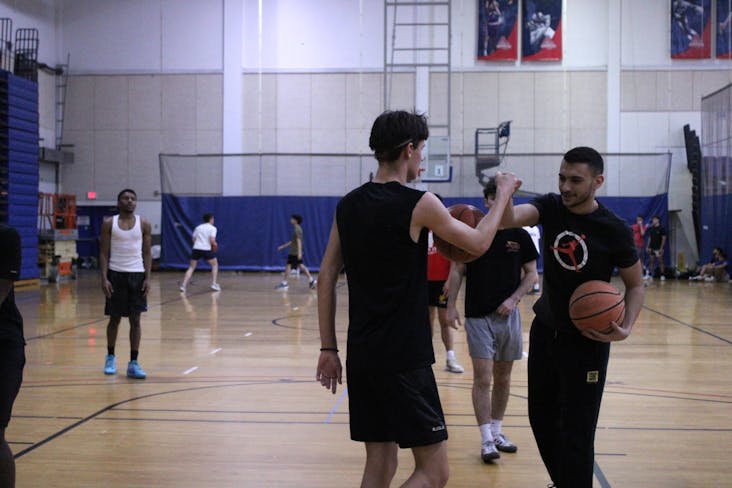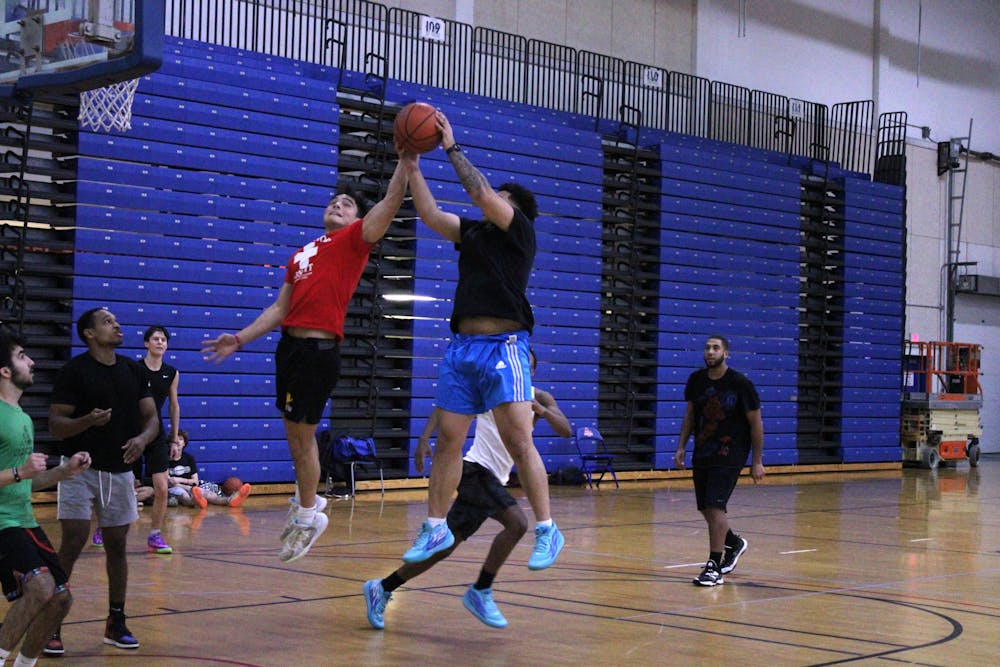In the summer of 1974, Sports Illustrated’s Rick Telander spent his time at the fabled Rucker Park in New York City, following along and taking notes as hundreds of people came in to compete in the summer leagues and tournaments, or just play pickup basketball at the park. He titled his book about these basketball courts “Heaven is a Playground,” a reference to a quote by English author G.K. Chesterton, who concluded that “the true object of all human life is play. Earth is a task garden; heaven is a playground.”
In 1988, twelve years after Telander published his account of his summer in New York City, Bender Arena opened on American University’s campus — far less prestigious than Rucker Park, but valuable nonetheless.
American has only developed two NBA players in its history. But for many students at AU, when the RecFit calendar lists open court from 7 p.m. to 11 p.m. on a given weeknight, Bender Arena might as well be Madison Square Garden. From elite high school AAU players, people who never played for their high school team, students from schools all across Washington D.C., to Youtubers with over one million subscribers, you never know who is going to walk through the doors of Bender Arena to play basketball.
You won’t find open court advertised anywhere. There are no posts about it on the RecFit or Club and Intramural Sports Instagram pages. Googling “American University open court” just leads to the RecFit calendar.
“I think I just kind of showed up one day,” said Beckett Harrison, a junior in SPA. “I had been previously in the afternoon but no one was really there, but I just came at night once and there were a bunch of people there. The year before my freshman year was all online so I think most of the people who came that night were there for the first time, and then it just kind of became a thing to come every Monday or Tuesday night.”
Harrison, the president of the men’s club basketball team, credits open court with growing the team.
“Honestly, I think almost everyone on club basketball met from open court,” Harrison said. “I table for the club at the club sports night and the involvement fair, but almost every person who we’ve had join the team has been someone I’ve met or been introduced to at open runs.”
But open court is not just for those who want to keep playing competitively after high school.
“Skill wise, the level really varies,” Harrison said. “There’s some guys like myself who had college offers, and then some who played in high school and some who may have little experience. For the most part, I think everyone has played some form of organized basketball, but it’s not like you’ll be excluded if you didn’t. Guys just wanna have fun, and everyone gets along really well there regardless of basketball skill.”
At the same time, open court has become a place for people and students from all around D.C. to gather and play basketball. Tyler Johnson is a junior at Howard University, having transferred there from American before this school year. While he was still at American, Johnson’s brother Chase, a Howard student, began coming to American to play basketball.

Even now, with neither brother attending American University, they continue to take the Metro from Howard to American to play basketball. When asked why, Tyler provided a contrast between the two.
“It’s crazy to say this, but the [competition] is lowkey better over there [at AU],” he said. “People pass the ball, they at least try a little bit on defense … it just feels more established.”
He said that while at Howard he experienced a more aggressive style of basketball with players constantly driving to the basket. Playing at American reminds him of playing in his hometown of Los Angeles: a more fluid, team-oriented style of play with more emphasis on outside shooting.
“At AU, it feels a little bit more like home,” he said.
It isn't just students that come to open court. Harrison and Johnson both say that one of their favorite moments from open court was when the Youtuber DC Heat, who has gained over 1.2 million subscribers through his basketball content and boasts a collaboration with Stephen Curry in his videos, came to American with what Harrison described as a “team of influencers” to play with AU students.
But no matter who comes through the doors of open court, it prides itself on being an inclusive environment for anyone who wants to play basketball at AU.
“I do think that it is a pretty respectful environment and definitely comparatively to other ones that I've played in,” said Morgan Gruber, a junior in SIS. Gruber said she is one of the few, if not the only, female students who come to open court.
“I think it’s generally an intimidation thing. Not necessarily anything that guys have done to make it intimidating, but just the idea of the environment of it,” Gruber said on why so few girls show up to open court. “Some of the guys who pull up are no good at all, and that’s what I tell girls. It should just be a blind confidence thing, like pull up. My thing is I’m never afraid of going and if I look stupid, like damn that sucks. I guess I’ll move on.”
Women’s basketball, along with men’s lacrosse and softball, is one of the few sports that does not have a club team at AU, despite there being an equivalent team for the opposite gender. While there are logistical reasons for there being no club team, the lack of a women’s club basketball team does contribute to part of the reason why so few girls show up to open court, according to Gruber.
“I definitely think a club team would bring out more girls,” Gruber said “But I don’t know how many would be ready and willing to commit to the time of it … When I was playing in high school, it was a six day a week commitment, and when I was done with high school, I mean I still love basketball, but I was like ‘I’m kind of ready for that kind of commitment to be over.’”
For many of the people who come to open court, basketball is who they are as a person. It’s something they have been doing for their entire life. Open court does not just provide an opportunity to stay fit and get exercise, but it provides continuity between their old self from high school and who they become in college.
Johnson credits basketball with teaching him how to structure his life. “I do everything so I can go play basketball,” he said. Harrison credits open court with introducing him to many new friends when he arrived on campus.
“Having a good day playing basketball, it’s just … I don’t know how to put it into words. It makes me happy … I know it’s a space I can go to do something that I love,” Gruber said.
To everybody who shows up to open court in Bender, it’s clear that basketball is so much more than just a game to them. If Telander calls Rucker Park a heaven, then Bender Arena is a home.
This article was edited by Penelope Jennings, Delaney Hoke and Abigail Pritchard. Copy editing done by Luna Jinks and Isabelle Kravis.





